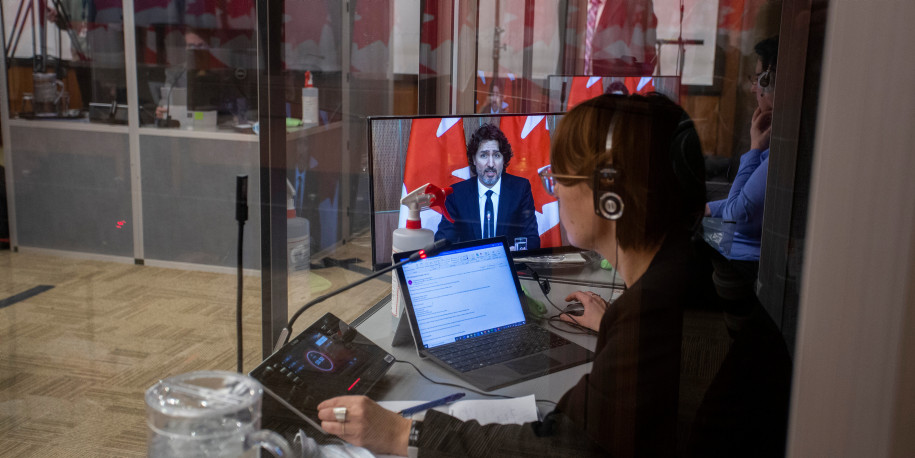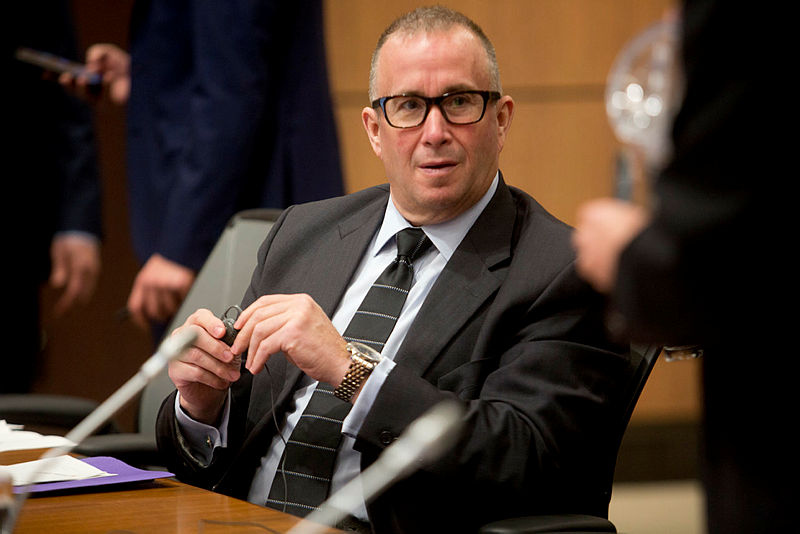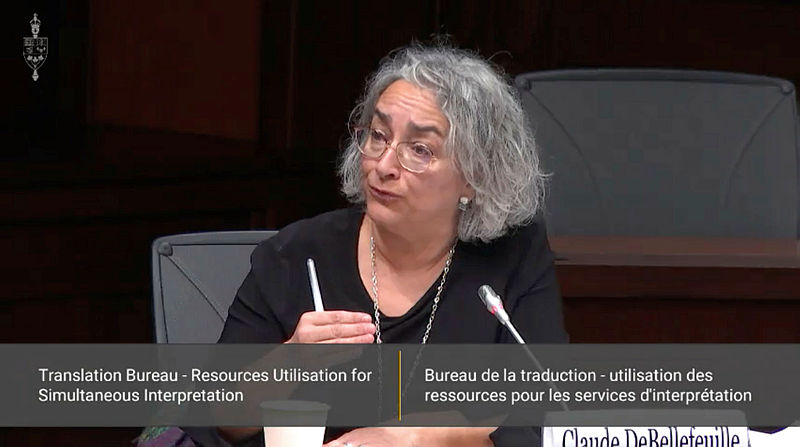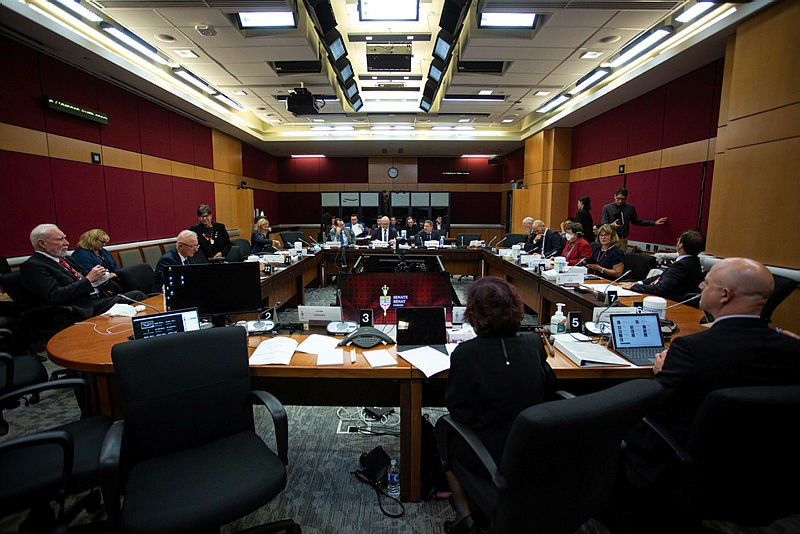House urges Senate to review practices in light of interpreter injury concerns

MPs are urging their colleagues in the Senate to take a second look at the way the Upper Chamber ensures virtual participants have adequate audio quality, as part of their ongoing conversation on the challenges faced by Parliament’s shared interpretation service.
At a Nov. 3 meeting, members of the Board of Internal Economy (BOIE) unanimously agreed to direct its chair, House Speaker Anthony Rota (Nipissing–Timiskaming, Ont.), to write a letter to Senate Speaker George Furey’s office highlighting the House’s processes to check sound quality and suggesting the Upper Chamber adopt the same.
“We can’t control what they do, but if we suggest to them that that should be the case and show them what we do … these are best practices that we have, [and we can] encourage them to do the same,” noted Rota.
After a suggestion by Conservative Whip Kerry-Lyne Findlay (South Surrey–White Rock, B.C.), the Board agreed to also send the letter to the Prime Minister’s Office, as cabinet uses the same pool of interpreters but does not use the same technical services (and therefore processes) as the House of Commons.
Hybrid proceedings have taken a toll on Parliament’s interpretation service. Early on after the adoption of hybrid proceedings in 2020, organizations representing staff and freelance interpreters with the Translation Bureau began raising the alarm over the increased rates of injuries—from headaches to tinnitus to acoustic shocks—being experienced as a result of inferior sound quality from virtual participants.
In late October, a parliamentary interpreter was sent to hospital after experiencing acoustic shock “following exposure to dangerous levels of toxic sound during a meeting” on Oct. 20, according to a press release from the Canadian Association of Professional Employees (CAPE), which represents staff interpreters. The meeting in question was one of the Senate Environment Committee, during which two witnesses testifying virtually did not wear recommended microphone headsets. The committee chair noted the lack of headsets, but allowed the meeting to continue, saying in French: “We will try to do this without headsets, and we hope it will not be too difficult for our interpreters and others.”
While the Senate no longer has an agreement in place to allow for hybrid proceedings (the old one expired in June), witnesses continue to be able to appear remotely before committees (as was possible pre-pandemic).
Among the steps taken to try to improve sound quality and protect interpreters—a limited workforce that’s essential to the functioning of a bilingual institution—all Parliamentarians have been issued ISO-compliant microphone headsets, which they’re instructed to use during virtual proceedings. On the House side, committee clerks work to send purchased, approved microphone headsets to all witnesses appearing virtually. According to Alison Korn, a media relations adviser for the Senate Internal Economy, Budgets, and Administration Committee (CIBA), the Senate provides witnesses with a list of approved headsets, which it recommends they buy themselves and submit a claim for reimbursement, though “on occasion, approved headsets have been shipped directly to witnesses.”

House chief information officer Stéphane Aubé attends a meeting of the Procedure and House Affairs Committee in May 2019. The Hill Times photograph by Andrew Meade
The decision to send a letter came on the heels of a presentation by House chief information officer Stéphane Aubé, updating Board members on the House’s efforts to reconcile its analysis of the sound being received by interpreters during hybrid proceedings with findings from the National Research Council (NRC).
As previously reported, in a fall 2021 report, the NRC indicated its testing pointed to the House of Commons’ audio-visual system as being responsible for “audio signal degradation and not the Zoom platform.” As Aubé told the BOIE in March, the House administration wasn’t “fully in agreement” with those findings as it had not “been able to replicate these results.”
On Nov. 3, Aubé said following further analysis, the NRC and the House together confirmed “that the audio systems that we are using for in-person are compliant with the ISO-standards … [and] that the hybrid format we are using does not indicate a loss of intelligibility.”
“But, clearly, we also found that there was a lot to be done in the process for people that were going to appear [virtually], and we have to prepare people who are going to appear. We have to work on those processes and decide if people should be able to participate or not, depending on the sound issues,” Aubé told MPs in French. “This is something we’ll have to work together on … to make sure that anybody who is appearing virtually has the right equipment.”

Bloc Whip Claude DeBellefeuille says she’s concerned with the Senate’s sound-testing process. Screenshot courtesy of ParlVu
In response to Aubé, Bloc Whip Claude DeBellefeuille (Salaberry-Suroît, Que.) said she finds “it concerning that the Senate may not have the same preoccupation that we have with the sound for interpreters,” and asked Aubé to confirm that the Upper Chamber has pages conduct sound tests.
“With respect to the Senate, no, it isn’t the technicians that are doing the tests. I’m not sure if it is the pages only … but in the House we [the IT team] do pre-tests when witnesses are scheduled and we also do it before the meeting starts,” replied Aubé.
In addition to adjusting shift hours and the number of interpreters per shift, the Translation Bureau has issued a number of criteria for virtual proceedings, including requiring the use of integrated microphone headsets, and asking virtual participants to use a hard-wired, not Wi-Fi, internet connection. Among other things, the bureau has also asked that a technician be present and sound checks be conducted prior to meetings.
On the House side, virtual witnesses are notified by committee clerks via email that use of provided microphone headsets is “mandatory,” explained a spokesperson for the House administration. Days before a meeting, “all witnesses are required to participate in a mandatory one-on-one audiovisual and connectivity pre-test session on Zoom,” said the spokesperson. Recommendations are provided if issues are identified, and notes on the results shared with the committee clerk. Another pre-meeting verification test, including a “mandatory sound check,” takes place the day of the meeting with “a dedicated IT Ambassador,” who’s in the committee room to monitor quality and provide support. A second IT ambassador monitors proceedings remotely. If audio issues can’t be resolved, “the committee will need to consider if the witnesses should be rescheduled for another time,” said the spokesperson.
The process is different in the Senate.
Witnesses scheduled to appear virtually are asked by email to confirm what type of device (computer, laptop, smartphone, etc.) they’ll use, that they have an updated version of Zoom, and that they have or will obtain a wired headset with a boom mic, which they’re advised they “must use,” said Korn. Witnesses are “offered a Zoom pre-test to verify their ability to connect to Zoom and their audio quality prior to their appearance,” which is organized by a committee support staff member (such as clerks) “based on a pre-set checklist” developed with Senate Communications, the Information Services Directorate (ISD), and House Multimedia Services, she said. Roughly 30 minutes before a meeting starts, an “onboarding,” pre-meeting soundcheck is done “with all virtual participants,” wherein “Senate pages, working under the direction of a committee clerk, check that each virtual participant has an approved headset, that it is properly connected” and that Zoom functions work, said Korn. If the pre-test is unsuccessful, or if witnesses aren’t properly connected during onboarding, an ISD technician is contacted to follow up. The ISD tech and technicians from the House Multimedia Services team are on hand in the committee room.

The Senate Legal and Constitutional Affairs Committee is pictured during a Sept. 21 meeting. The Senate’s hybrid agreement expired last June, but witnesses are still able to testify virtually before committees. The Hill Times photograph by Andrew Meade
Pages previously helped clerks and ISD technicians onboard Senators when the Senate had hybrid proceedings. Until October 2022, Korn said interpreters were part of the onboarding process for virtual participants and “validated the sound quality for each”—a practice she said the Translation Bureau stopped “in order to maximize service hours.”
“The Senate is currently developing a program and hiring necessary technical support staff so that pre-testing will become mandatory for all committee witnesses,” she said.
CIBA’s steering committee sent a letter to all Senate committee chairs on Nov. 3 reminding them that virtual witnesses must use appropriate microphone headsets, noted Korn.
At the BOIE on Nov. 3, DeBellefeuille also made a number of recommendations—which were discussed but ultimately no action was agreed to—including that the Board “insist through every means” available that anyone appearing virtually during House proceedings use approved microphone headsets.
“We still have Members and witnesses and even chairs that don’t wear their headset as they should,” she said, adding that while some House committees take this responsibility seriously, others do not.
DeBellefeuille recommended committee chairs not be allowed to lead meetings virtually, noting that over a three-week period her office counted nine chairs who “were usually virtual,” even when all or most committee members were present in person.
“If the members are there, then the chair should be there in person,” she said, adding that if a chair is sick, someone—like a deputy chair—should replace them.
She also recommended that committee clerks encourage witnesses to testify in person to flip the trend noted in a Procedure and House Affairs Committee report that 70 per cent of witnesses are testifying remotely and 30 per cent in person. She additionally raised concern that sound checks are not consistently being done for all witnesses (namely, the second panel of witnesses, when multiple panels appear during a meeting).
Findlay agreed with DeBellefeuille’s suggestion that committee chairs be instructed to chair in person, saying “to a certain extent Members of Parliament are preferring their convenience to the health of these workers, who are essential to our business.”
With new hires not keeping up with attrition, the Translation Bureau’s workforce was dwindling even pre-pandemic, and with interpreters requiring medical leave or reduced hours as a result of virtual working conditions, the shortfall has been affecting Parliamentary work by causing House and Senate committee meeting cancellations. It was one of the reasons cited by Senate group leaders in opting not to renew hybrid proceedings in the Red Chamber this fall.
In June, the House launched a pilot project to test the use of remote and external interpreters not accredited by the Translation Bureau, citing the bureau’s inability to meet the demand for interpretation services. CAPE, the International Association of Conference Interpreters Canada, and Conservatives have criticized this pilot for threatening the quality of bilingualism.
BOIE members discussed the fact that House committee meetings continue to be cancelled as a result of a lack of interpretation resources, with Findlay suggesting the government has “taken upon itself to cancel committee meetings unilaterally of late,” and calling for a “return to greater consultation and co-operation.”
Mention was made of a letter sent by the BOIE to the Translation Bureau about its short-, medium-, and long-term resource capacity.
DeBellefeuille noted 57 “events” can be accommodated on a given day, but said “as soon as the House extends its hours, then we have to cut committees, and I find that absurd.”
“We can’t continue to cut committee meetings because we lack resources. We’re told that this is a problem across the country. I would like to know how many events we would need to have a situation where, if the House sits ‘til midnight, we don’t have to reduce the number of committee meetings,” she said. “Right now, even if resources have been added, we still are losing meetings.”
Editor’s note: This story was updated on Nov. 10 to reflect that an ISD technician and technicians from the House Multimedia Services team is present in the committee room during Senate meetings.
lryckewaert@hilltimes.com
The Hill Times






 LICENSING
LICENSING PODCAST
PODCAST ALERTS
ALERTS













